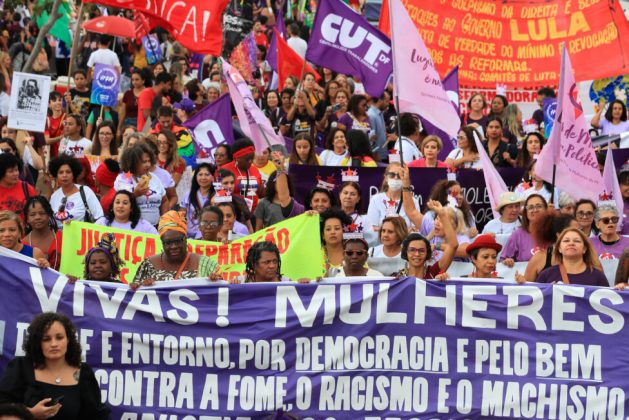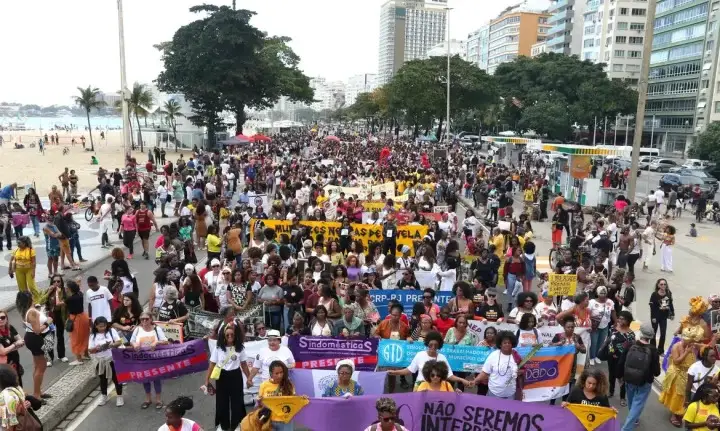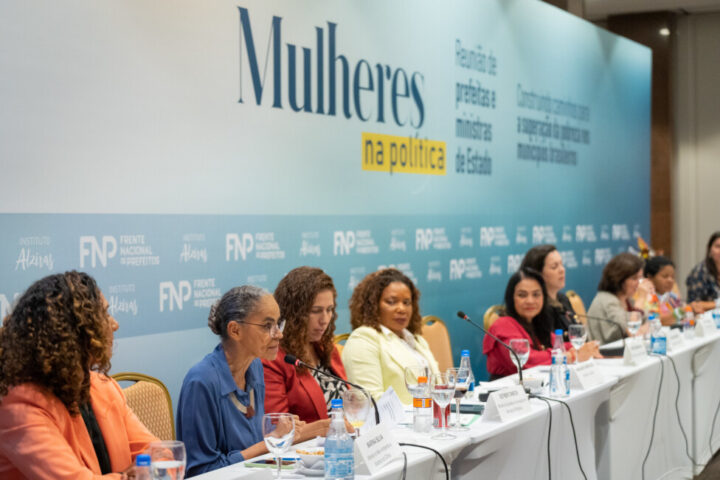New Attempts to Reduce Gender Inequality in Brazil

RIO DE JANEIRO, Mar 06 (IPS) - This article is part of IPS' coverage of International Women's Day, March 8.Brazil is beginning to test the effectiveness of a gender pay equality law passed in July 2023, a new attempt to reduce inequality for women in the world of work.
This Friday, Mar. 8, International Women's Day, is the deadline for companies with more than 100 employees to publish their first half-yearly salary transparency reports, with comparative data on remuneration and the distribution of hierarchical functions between men and women, and between different ethnic groups, nationalities and ages.
To break down the inertia of gender inequality, the United Nations agency that promotes women's rights, UN Women, decided that this year's theme for International Women's Day would be "'Invest in Women: Accelerate Progress", which the global community has pledged to achieve by 2030.
The wage equality law "is a measure that just remains on paper, not a practical one," said Hildete Pereira de Melo, an economist who has been studying gender inequality for more than 40 years and doubts the effectiveness of the new legislation.
Equal pay has been legally established in Brazil since 1943, when the Consolidation of Labor Laws was approved, but it is not enforced, she argued. Even in the courts, women accept any agreement as "the weaker party," she told IPS in an interview in Rio de Janeiro.
Wage inequality is now punished
But now it is different: a penalty will be imposed on companies that do not publish their semi-annual report, a fine of up to 100 minimum wages, totaling 141,200 reais this year (28,500 dollars), argued Marilane Teixeira, a researcher at the Center for Trade Union and Labor Economics Studies (Cesit) of the University of Campinas.
With the reports from the companies and the data it obtains through other means, the Ministry of Labor and Employment will be able to publish the first results, with an overview of how the more than 50,000 large companies in Brazil deal with the issue of gender- and race-neutral wages.
Previously a company was subject to penalties in the case of "inequalities motivated by segregation," identified through inspection by the authorities. But now there is a new requirement of a public report, Teixeira told IPS from Brasilia.
The new exposure of companies triggered widespread complaints and arguments that improper data would be revealed, but the report does not include "any stealth data, just averages and percentages of women employees and their positions" in the corporate hierarchy, she explained.
Reactions from businesspersons and repercussions in the media reflect "the impact of the measure" and the changes it will foment, said the economist, who helped the government draft the new law.
"It is a step forward and we hope that it sticks" and is effective, unlike many laws that remain only on paper, said Isabel Freitas, a social worker and technical advisor of the Feminist Center for Studies and Advice (Cfemea).

Legislative advances
Her positive assessment is based on the "two novelties": the requirement of the half-yearly report, which constitutes a "public transparency tool" and fosters equality, and the fine imposed on companies that do not comply, of three percent of the total wages and salaries paid by the company.
But the law has limits. It only applies to companies with more than one hundred employees, which means its effect does not reach the small and micro businesses that provide 70 percent of formal sector jobs nor the informal ones that account for about 40 percent of the total number of workers. And the fine cannot exceed the equivalent of 100 minimum wages.
It does not benefit, for example, domestic workers, who number six million in Brazil, mainly black women, who suffer the worst discrimination, Freitas lamented.
But the law is "one more step" that could help in the fight against "the basket of inequalities" affecting Brazilian society, especially women, she told IPS by telephone from Brasilia.
"If you are a black woman, your chances of suffering inequality increase. Restrictions pile up for women who are black and poor from the outlying urban neighborhoods, who are over 40 years old and have had little to no education," she said.
Inequality suffered by women is not just a matter of wages. They are concentrated in lower paid activities, such as domestic work, basic education and the poorest paid parts of the health care system.
The scarce representation of women at all levels of power is a major obstacle. There are only 91 women in a lower house of 513 deputies and 15 women senators out of a total of 81. In other words, they make up only 17.8 percent of the current Congress (2023-2026) dominated by conservative legislators.
One of the main causes of these inequalities is the sexual division of labor, which assigns to women practically all the work of social reproduction and care tasks, the three interviewees concurred.

Cultural hurdles
Added to this is a cultural heritage that uses promotion evaluation criteria that favor male workers, said Teixeira.
When it comes to promotions, companies generally take into account activities "that exclude women, such as weekend courses, trips and dinners with clients," which are unfeasible for those who have to take care of the house, the children and sick members of the family, she said.
"In Brazil 42 percent of women are solely homemakers, and the other half who are in the labor market are also homemakers," said Pereira de Melo.
The basic solution to the tangle of factors leading to inequality against women are full-time basic education schools and day care centers providing care for 10 hours a day, with universal coverage for all children in order to neutralize disadvantages for women in the workplace, she said.
The ideal would be full-time school for adolescents as well, but it should be available at least in the first stage, until students are 14 or 15 years old and the absolute need for maternal care is reduced, she said.
In addition, a broad cultural transformation of society would be necessary, especially in relation to the role of women, but culture is something that changes very slowly, she acknowledged.
Initiatives on several fronts are underway in Brazil to drive these changes.
On Mar. 5 the launched, for example, the campaign "Justice for all women", to highlight women's rights in general, including girls, adolescents, pregnant and disabled women, and to promote a gender perspective in all the country's courts.
Violence against women, reflected in the increase in rape, domestic violence and femicides - gender-related murders of girls and women - is currently a priority of the campaign and the judicial system.
The Articulação das Mulheres Negras do Brasil (Network of Black Women of Brazil) is working to coordinate the action of 45 organizations distributed throughout the country that in the month of March this year are planning 140 demonstrations.
For November 2025, it is preparing a "March against racism, violence and for the good life", a national mobilization that will culminate in Brasilia, repeating the first march of its kind that took place in 2015, with about 100,000 participants, to demand the rights of 49 million women, that is, a quarter of Brazil's population of 203 million.
It is a global struggle. "The global economy is based on the systematic exploitation of women," concludes a study by Oxfam, a confederation of 21 social organizations around the world.
According to its data, women earn only 51 percent of what men earn, as they are concentrated in precarious and poorly paid jobs.
© Inter Press Service (2024) — All Rights Reserved. Original source: Inter Press Service
 Global Issues
Global Issues